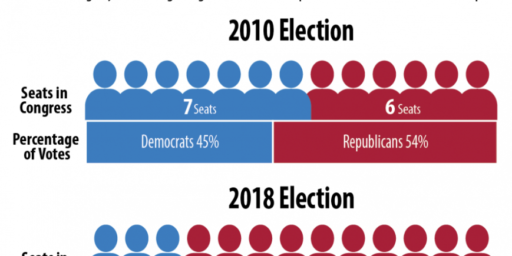Gerrymandering Civility
Former Senator and RNC Chairman Bill Brock argues that gerrymandered districts in the U.S. House have led to a dramatic decline in civility:
Let’s assume that 60 or 70 percent of the voters in any district are adherents of one political party. Candidates in that district have to be concerned with winning only the primary; the general election is a foregone conclusion. Winning the primary requires that they talk only to the local party activists — usually the party “purists.” In more than 90 percent of congressional districts, success in the dominant party’s primary is tantamount to election.
If a candidate need talk only to those who are most fervent in support of the party, he or she doesn’t have to listen to, or even speak to, people in the center, much less those of the other party. As a matter of fact, candidates seen cozying up to people on the other side of the political aisle might put their own primary prospects at risk.
We’re increasingly moving to a political system that looks, and feels, like a political barbell: one where all the weight is at the ends of the spectrum, leaving those in the center with little voice or opportunity for impact. It’s dangerous, it’s counterproductive and I think it represents an assault upon the constitutional premise of balance which has so graced the first two centuries of this republic.
His solution is straightforward:
One state has chosen a better route: In Iowa, the districting is done by an independent commission, and, as I understand it, the rules are fairly straightforward. They seek to draw districts that are compact and contiguous — both happily appropriate constitutional terms — and, to the extent possible, ones that adhere to county lines. All this without regard to party. The result: Most contests in Iowa really are contests. Many would argue that the Iowa delegation has been consistently one whose members seek solutions that often require the participation of partisans from both side of the political aisle. Not a bad result.
This sounds logical enough, although I have some qualms about taking a fundamental power assigned by the Constitution itself to the state legislatures and handing it over to blue ribbon panels.
As intellectually satisfying as the “gerrymandering leads to incivility” argument is, however, I would ask a simple question: Is the House alone in this trend? Most observers would say that the Senate has also become less civil during the period in question. Given that, as required by the Constitution, all fifty states elect Senators by the at-large method–thus taking gerrymandering completely out of the picture–gerrymandering surely doesn’t explain decreased comity in that body. One suspects, therefore, that a larger societal trend is at work.




There you go being logical again. Quit that! 😉
I agree about the constitutional concern, but there is an alternative to make the House more competitive: increase the number of representatives. It’s been fixed at 435 since the early 20th century and you could argue — though I can’t prove it empirically — that there is a starvation of representation. Representatives now have constituencies of roughly 650,000 people, making it less likely that they know their representative.
However, knowing how representatives (and Senators) are apt to spend public money to secure votes, I wouldn’t support an increase in House size without a line-time veto in place first. The number of earmarks — which is already obscene — would go through the roof.
Actually, whether the Senate is more collegial than the House is irrelevant to the question. The issue is longitudinal–how do the institutions compare to themselves over time. Most seem to argue that the Senate is much less collegial than it was 20-30 years ago.
The House should be “Representative” and as the (D)’s lose ground it should be no surprise they use illegal tactics, eg. the flight from Texas, to obstruct.
It is quite clearly the (D)’s that are lacking in ‘civility’.
Assuming the Senate is becoming less civil too, that doesn’t necessarily mean that it doesn’t have anything to do with gerrymandering.
It could reasonably be the case that gerrymandering has led to polarized House candidates, which have then conditioned the people to expect and elect polarized Senate candidates too. Speaking on the scale of 20-30 years, this isn’t out of the question.
It’s speculative, but so is the deduction that gerrymandering hasn’t had an indirect effect on Senatorial politics.
And either way, there’s no obvious harm in addressing the impact it probably has had on the House.
There are other values to protect besides collegiality. Gerrymandering may give diverse groups representation that genuinely reflects their interests and values.
On a somewhat related note, I read some years ago that seats are allocated based on total population, and not on the basis of citizens-only population. Is that true? If so that seems really unjust.